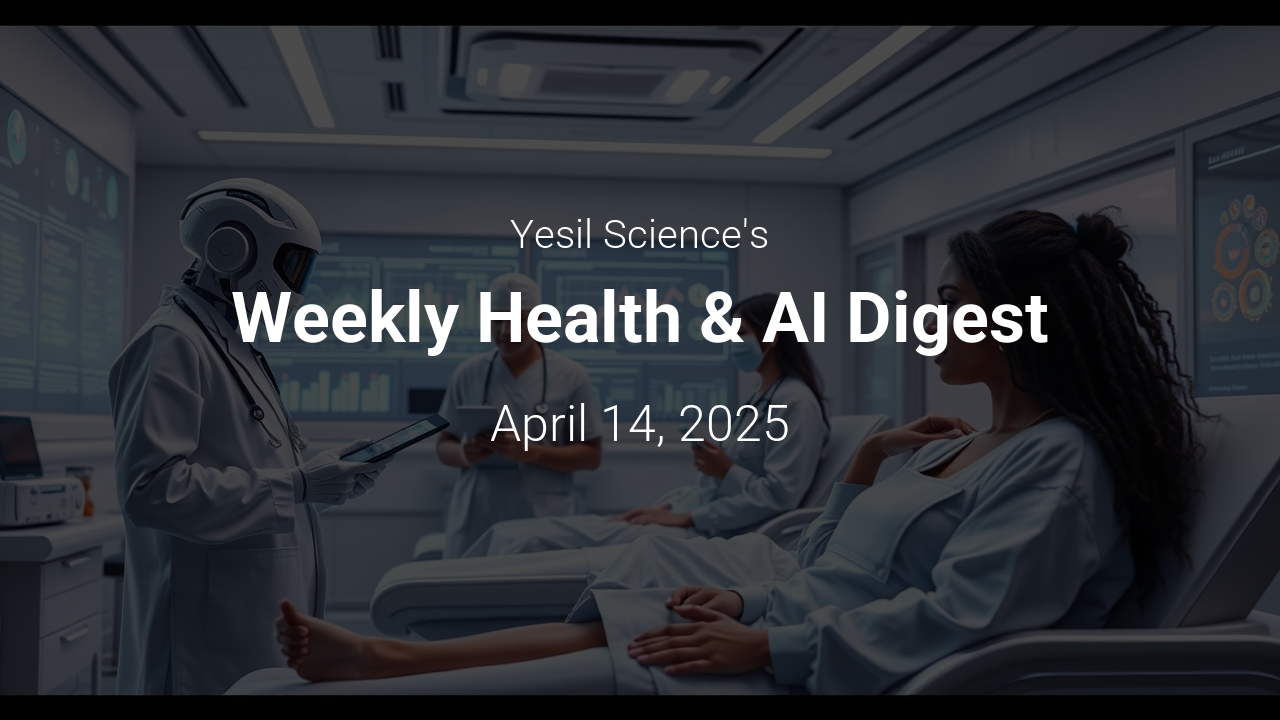Here are the latest breakthroughs in health & AI (April 14, 2025 week)
Endometrial receptivity testing boosts clinical pregnancy rates by 22.78% in recurrent implantation failure cases. 📈👶
——-
🔹 Mapping the use of artificial intelligence in medical education: a scoping review.
AI in medical education: 34 studies reveal gaps in curriculum, ethical training, and digital competence. 📚🤖
——-
Interdisciplinary teamwork enhances speech-language pathology, addressing children’s needs with AI technologies. 🤝📊 #TeamScience #CSD
——-
🔹 Peninsula Pathology Network Adopts Secure Cloud Infrastructure
Peninsula Pathology Network implements secure cloud infrastructure for enhanced collaboration and efficiency in pathology services. 🌐🔬
——-
Recent research highlights the role of multi-omics and machine learning in improving hepatocellular carcinoma outcomes. 📊🔬
——-
🔹 Cedars-Sinai’s Chief AI Officer Discusses AI’s Role in Healthcare
Cedars-Sinai’s Chief AI Officer, Mouneer Odeh, discusses AI’s growing impact on healthcare and improving caregiver experiences. 🤖🏥
——-
Remdesivir shows promise in reducing mortality for hospitalized COVID-19 patients. 🏥📉 Real-world data supports its effectiveness.
——-
🔹 Study Highlights Underrepresentation of Minorities in AI Mammogram Analysis
Study reveals minority underrepresentation in AI mammogram analysis, raising concerns about fairness and accuracy in breast cancer detection. 📊🤔
——-
A recent PubMed article discusses a machine learning model predicting portal vein system thrombosis post-splenectomy in cirrhosis patients. 📊🩺
——-
🔹 Explainable AI for enhanced accuracy in malaria diagnosis using ensemble machine learning models.
Exploring AI’s role in malaria diagnosis 🦠🤖: Ensemble models enhance accuracy and transparency for better patient outcomes.
——-
🔹 Accountability in AI-Driven Medical Errors
AI in healthcare raises concerns about accountability for medical errors. Physicians face pressure to trust technology without adequate support. ⚖️🤖
——-
🔹 Future horizons in diabetes: integrating AI and personalized care.
AI and personalized care are transforming diabetes management. Continuous Glucose Monitoring enhances treatment precision. 🌟📈
——-
🔹 DeepSeek: AI Collaboration Tool for Healthcare Professionals
DeepSeek: AI tool enhances healthcare collaboration 🤝. It supports doctors with insights, improving patient communication and diagnostic efficiency. 🩺📊
——-
🔹 Neuranics Secures $8 Million for Innovative Magnetic Sensing Technology
Neuranics secures $8 million for magnetic sensing technology, enhancing gesture recognition and heart signal tracking. 🧠💰
——-
Large language models show promise in educating Chinese patients with ocular myasthenia gravis. 📚🤖 Accuracy and readability are key factors.
——-
MedeAnalytics collaborates with Socially Determined and Mathematica to improve insights on social determinants of health. 📊🤝
——-
AI in healthcare offers potential benefits, but careful selection and integration are crucial for success. 🤖💡
——-
🔹 AI Therapy Chatbot Demonstrates Significant Mental Health Benefits in Clinical Trial
AI therapy chatbot shows promise in improving mental health, with significant symptom reductions reported by users. 🤖💬
——-
A recent study developed an LSTM model to predict allergic rhinitis outpatient visits, enhancing treatment and prevention strategies. 🌿📊
——-
🔹 Seoul National University Hospital Develops First Korean Medical Language Model
Seoul National University Hospital has created Korea’s first medical language model, enhancing local healthcare efficiency. 🏥📚
——-
That’s a wrap for this week’s digest! Stay tuned for more health & AI updates. 🚀💡
#HealthAI #TechNews
